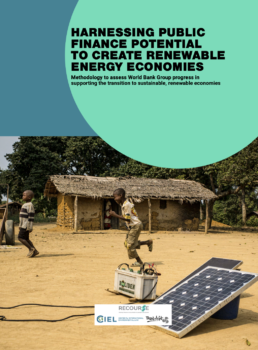A new report by Recourse, TrendAsia and CIEL (Center for International Environmental Law) urges the World Bank Group (WBG) to shift its financing policy and practice from fossil fuels invesments towards supporting renewable energy economies. In the context of climate change, the report reiterates how critical it is for countries to set a clear and rapid pathway for transition to a sustainable renewable energy future. This will require a combination of short-term investment to meet the current needs to deliver 2030 targets, while planning for investment in long term deep decarbonisation of the economy over the following decades.
The World Bank Group has financed and incentivised up to $165 billion in fossil fuel investments since the Paris Agreement was signed. However, a combination of global scientific consensus and international political agreements now requires the WBG to act as a global standard setter for both public and private financial institutions towards the rapid transition to a renewable energy economy. WBG has a critical role in this context and must channel its resources, capacity building and policy guidance to renewable energy investments. This should be consistent with global climate objectives as well as social and human rights safeguards. Low- and middle-income countries will require finance sourced from public, private and multilateral institutions, to take them on this trajectory.
This report sets out a methodology for the WBG to align its investments, policy advice and capacity building with the Paris Agreement, to lead the way on investing in a thriving renewable economy for the countries it invests in. At the same time the WBG and other International Finance Institutes (IFIs) should be supporting client countries to deliver Sustainable Development Goal 7 (SDG7) and 5 (SDG5) to provide universal sustainable energy access by 2030 and contribute to gender equality. Ideally a coherent approach across IFIs using this methodology aligned with science-based targets, and national energy transition plans can provide countries with the confidence, capacities, and resourcing to transition their energy sector to renewable and zero carbon energy security while providing access for all.
Photo: Dan Meyers/Unsplash


